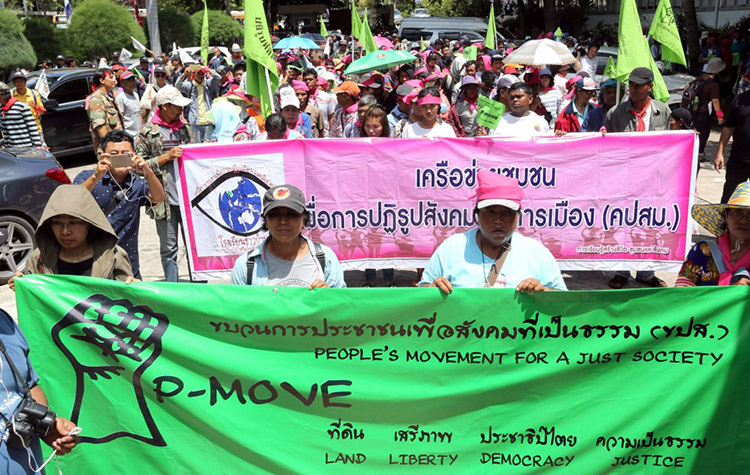
(Bangkok, 15 May 2018) – The Asian Forum for Human Rights and Development (FORUM-ASIA), Amnesty International, and Protection International condemn the harassment and intimidation by Thai authorities of members of the People’s Movement for a Just Society (P-Move). Such acts of harassment and intimidation include preventing members from participating in peaceful protests in Bangkok and arbitrarily arresting them on 2 May 2018, when they were simply exercising their right to peaceful assembly with the aim of advocating for the protection of land rights. We urge the Government of Thailand to respect, protect, and promote the right to peaceful assembly and lift impermissible restrictions to the exercise of this right, including the Head of the National Council for Peace and Order (NCPO) Order 3/2015, the Head of the NCPO Order 13/2016, and the 2015 Public Assembly Act.
P-Move is a local network of grassroots communities advocating for the rights of marginalised people in Thailand. They focus mainly on land rights issues, and demand fair compensation and community participation in decision-making processes of state policies. Prior to the 2014 coup d’état, P-Move had been involved in several dialogues and consultations with the Government on inclusive and participatory processes for formulating state policies on land rights issues.
Unfortunately, this kind of dialogue between civil society and the Government of Thailand reduced since the military-led NCPO took power in 2014. Due to the hostility towards civil society participation in land rights issues, P-Move decided to stage a peaceful protest on 30 March 2018 in Bangkok. The group submitted letters to several government representatives, calling for an open dialogue with relevant state agencies. After 30 days without any response from the Thai authorities, P-Move decided to organise another peaceful protest on 2 May 2018, also in Bangkok.
The authorities have used harassment and intimidation as tools of repression against P-Move members, even during the preparation phase of the protest. Members and supporters of P-Move reported being closely monitored by the authorities, receiving phone calls, and questions about their involvement.
On 1 May 2018, around a 100 members of P-Move were blocked by the authorities at checkpoints in Chiang Mai and Lamphun Provinces, which prevented them from joining the peaceful protest in Bangkok. Bus drivers transporting members of P-Move were questioned and requested to take drug tests. The drivers were later held at a nearby military base without being allowed to contact anyone. P-Move members were stranded at the checkpoint in Lamphun Province, where they were forced to stay overnight.
The next day on 2 May 2018, Thai authorities handed a letter to members of P-Move, claiming that their stay at the checkpoint was a protest as well, and therefore needed a permission under the 2015 Public Assembly Act. Later in the day, Military and Police officials arrested three leaders of P-Move based on the special powers granted under the Head of the NCPO Order 13/2016 for violating the Public Assembly Act. However, their stay at the checkpoint clearly does not qualify as a public assembly, and therefore cannot be regarded as an offence. It was beyond their control, as they were left with no other option but to stay there. This makes their arrest baseless. Indeed, the fact that they were later released without any charges being pressed, and forced to go home, supports this conclusion.
Around 900 people demonstrated peacefully at different locations in Bangkok on 2 May 2018. Hundreds gathered outside of the United Nations Economic and Social Commission for Asia and the Pacific (UNESCAP) building, one of the main locations of the protests. Police officers, including plainclothes policemen, monitored the protest. Representatives of P-Move also submitted a letter to the UN Resident Coordinator of Thailand.
Protesters later moved to other Thai state agencies to seek discussions with representatives of the Thai Government. After discussing with P-Move, the Minister of the Office of the Prime Minister agreed that he would bring up P-Move’s concerns during the next Ministerial meeting on 8 May 2018, and asked for an end to the demonstrations. P-Move insisted that they need to continue to demonstrate until they receive a more concrete solution from the Government. On 12 May 2018, more than ten days of their peaceful demonstration started, P-Move returned home after signing a Memorandum of Understanding (MoU) with Thai authorities.
FORUM-ASIA, Amnesty International and Protection International therefore urge the Government of Thailand to abide by its international human rights obligations under the International Covenant on Civil and Political Rights (ICCPR), to which Thailand is a State Party, including guaranteeing the right to peaceful assembly. This also entails not engaging in acts of judicial or other forms of harassment of individuals, including P-Move and its members, exercising this right.
The continuous intimidation and harassment of civil society creates a hostile environment that impedes civic space. We urge authorities not only to drop the criminal proceedings against P-Move members for exercising their right to peaceful assembly, but also to repeal or amend any legislation restricting this right, including the Head of the NCPO Order 3/2015, the Head of the NCPO Order 13/2016, and the 2015 Peaceful Assembly Act. We further request that authorities respond to P-Move’s demands with concrete proposals in a timely manner, in accordance with the signed MoU.
**
For a PDF version of this statement, please click here.
For further information, please contact:
East Asia and ASEAN Programme, FORUM-ASIA, [email protected]



